- Home
- Tawdra Kandle
The Anti-Cinderella Page 3
The Anti-Cinderella Read online
Page 3
“Thanks, Handsome.” I paused behind my grandfather’s chair to lean over and give him a warm hug and a kiss on his cheek. Out of the corner of my eye, I saw Nicky rising to stand. When I straightened again, my hands resting on Handsome’s chair, my childhood friend held out his arms.
“For old times’ sake?”
I heaved a sigh, but it was more for dramatic effect than anything else. “Fine. But I’m going on record that I’m not happy about this, Honey.” I shot her a glare. “You made me dress up. You said I had to wear heels. I won’t forget that.”
“Aren’t I worth the effort?” Nicky’s hands ghosted down my arms, his touch gentle as he drew me against him for a hug. The deep sniff I took was instinctive; I remembered how he used to smell so good, and he hadn’t lost that in the last decade. As he embraced me tighter, I was keenly aware of his hard chest and the muscles in his arms. Nicky hadn’t gone soft, but that wasn’t a surprise, either.
I let my eyes close and pressed my hands into his upper back, returning the hug. I felt the tickle of his breath over my neck, and I thought I heard him swallow, too. I wondered if he was remembering the last time we’d been this close—or if he’d forgotten it altogether.
“Well, sit down, sit down,” Honey fussed, skirting the table to take her own place. “Mrs. Muller made us a lovely dinner, and she’s been chomping at the bit to bring it out.”
I disentangled myself from Nicky and stepped back to take my seat across the table from him. “It smells good. And I’m famished.”
“Of course, you are.” My grandfather chuckled. “I don’t know where you put it all, sweetie. You must have a hollow leg.”
I winked at him. “It’s clean living, Handsome. That, and good genes.”
“Those come from your grandmother’s side of the family. But you can’t stay still, either. That’s at least part of the equation.”
“True.” I shook my napkin into my lap and turned my attention to our guest. “So, Nicky. Catch me up on life. What’ve you been up to since you were sixteen?”
He quirked one eyebrow at me. “Seriously?”
I feigned amazement. “Of course. Hey, I’ll go first. I finished high school—not with honors, exactly, but with good enough grades to get me into a decent college in Florida. I decided to go south because I was tired of the winters in Philadelphia, and I figured Honey and Handsome’s place on the beach would be a good spot for studying.”
My grandfather snorted, and I ignored him.
“While I was in college, I finally gave in to the love I’d been denying all of my life . . . science. Namely, plant biology and sustainability practices. I majored in bio, and then these totally cool people who birthed my father—” I grinned at my grandparents. “They offered me a full ride to the graduate program of my choice, provided I kept up my grades and worked for them after I finish my degree. My friend Shelby, who I’d met at school in Florida, was applying for a scholarship at Grant, up here in Maine. I thought, what the hell, maybe I should try the extreme north, after spending four years in the extreme south. I got in, and so did Shelby. We’ve been living up here, studying and generally behaving ourselves, since then. We graduate next spring—we’re just finishing up the current term now.” I spread out my hands on the table. “And that’s what I’ve been doing for the last ten years. Your turn.”
When Nicky didn’t immediately respond, I added, “Come on, now. Fill me in. I mean, you don’t think I’ve been reading about your life in magazines or following your groupies on social media, right?”
He huffed out a short laugh. “Touché. All right. I went to Eton, where I eventually finished with two A-levels, in history and biology. After that, I went to St. John’s College at Oxford.” One side of his mouth lifted into a half-smile. “And since then, I’ve just been a playboy, flitting around from beach to ski resort, charming women and fending off the envy of other wealthy noblemen everywhere. As one does.”
“Oh, Nicky, don’t be so modest.” Honey shook her head. “You are one of the hardest working people I know.” She turned to me as the housekeeper waltzed into the dining room with serving bowls. “Nicky is the patron of Waste Not, the organization in the UK that fights hunger, and he’s on the international board of No Hungry Child, which works to eradicate childhood hunger worldwide.”
“Speaking of hungry people . . .” Mrs. Muller clunked down a bowl on the table and patted my shoulder. “I made your favorite new potatoes, Kyra. And the broccoli here, it’s what you brought me over the other day from your greenhouse.”
I smiled. “Thanks, Mrs. M. It all looks delicious.”
“You have a greenhouse?” Nicky picked up his fork, sliding a glance my way. “That sounds ambitious.”
“It’s not my personal greenhouse. It’s just where I work at the college. Or one of the places where I work.” I helped myself to a healthy spoonful of potatoes. “But enough about me. What brought you across the pond?”
“Oh, a few things. Meetings about a conference NHC is doing in the fall. Visits to some potential sponsors for Waste Not.” He gestured toward my grandfather with a jerk of his chin. “And a very illuminating chat with the owners of one of the most charitable and passionately altruistic companies I know.”
I stabbed a potato and took a bite. “They’re pretty great. I’ll give you that.”
“I think Honey Bee Juices could only benefit from a partnership with Waste Not.” My grandmother sipped her wine. “It kills me to think of how much perfectly acceptable food is often wasted because of regulations and policies.” When Handsome began to interrupt, she lifted her hand. “I know, I know. Those rules are there for a reason. I understand that. But the rules don’t say we have to trash fruit and veggies that we can’t use in our juices. They only say we can’t serve them to paying customers. I’m excited about the idea of having a way to put what we can’t use to a better purpose.”
“That’s exactly what we’re trying to communicate to other businesses.” Nicky grinned. “Auntie Maggie, you’d be a wonderful spokesperson for Waste Not. I’m tempted to kidnap you away to London and introduce you to some of our restaurant owners over there.”
“Hey, now.” My grandfather glared. “Keep your hands off my woman, buddy. Prince or no prince, my Maggie isn’t going anywhere without me.”
“Yes, sir!” Nicholas raised his hands. “I promise, I’d take you both.”
We all fell silent for a few minutes as the food moved around the table. I snuck a couple of peeks at Nicky as we ate. Ten years had definitely been kind to him. He actually looked better here, in person, than he did in the pictures I’d seen. There was something broader and more magnetic about his presence. Or maybe that was just me, bringing my old crush vibes back to life.
The sleeves of his white dress shirt didn’t do much to disguise the muscles in his arms. I wondered if they came from hours at some hoity-toity gym. Most of the guys I knew at Grant earned their bulk through hours of labor, in the fields or the gardens or with the livestock they raised. I couldn’t imagine Prince Nicholas using a shovel to move compost and manure or a fork for turning over the earth.
Still, he didn’t seem too polished or glossy. I tried to picture him in the greenhouse or tromping around the gardens with me, and I couldn’t quite get there.
“What exactly are you studying in grad school, Ky?” As if picking up on my thoughts, Nicky smiled at me as he cut into the chicken breast Mrs. Muller had set onto his plate. “Biology, you said?”
“Bio was my major in undergrad,” I corrected. “My masters will be in sustainable crops and farming practices.”
“Which fits in nicely with her future employment.” Handsome winked at me. “One of the changes we’ve made in the last five years is that we’ve acquired our own small farms and orchards for sourcing fruits and vegetables. It makes sense both economically and ecologically. Kyra’s going to help us make those new properties more efficient and sustainable. More healthy crops and less food in landfills.”
>
“That sounds interesting.” Nicky leaned back in his chair, studying me. “Maybe I’ll kidnap you, too. I can think of quite a few people in England who’d like to hear more—and others who might not like it, but need to listen.”
“Tell him about your study, sweetie.” Honey nudged me, but before I could say anything, she launched into her own explanation. “Kyra did research into something called intentional non-interventionism. She’s conducting her own experiments and studies for a research paper. It’s fascinating.”
“Nothing like a grandmother to give something a big build-up,” I remarked dryly. “Honey, you’re going to go with me to present my paper to the advising faculty, right? I think I’ll need your enthusiasm to help sell it.”
Honey laughed. “I have confidence that it will stand on its own merits, sweetie. Now explain it to Nicky.”
Nicky rested his elbows on the edge of the table and gazed at me, interest and amusement in his eyes. “Yes, tell me all about this. Slowly and in plain English, please, so I can follow along.”
I gave a little shake of my head. “Don’t try to play the dumb royal card, Nicky. I remember you as being a smarty-pants when we were kids. You were always trying to convince me that you knew more than me about everything, from books to math to . . .” I narrowed my eyes. “Sand castle design.”
“How long are you going to hold the grudge about that, Ky? I was right. You were wrong. It was eleven years ago. Get over it already. I have.” His teasing smile dared me to argue.
“Ha!” I crossed my arms over my chest. “Easy for you to, uh, get over it. You won the contest. And then you gloated for the rest of the summer.”
“It wasn’t really the rest of the summer. I believe I left Florida two days later.”
The corner of my mouth curled up. “It just felt like it to me, I guess. Also, that was the first thing you brought up the next summer, as soon as you got there. You never let me live it down.”
“Eleven years, Ky. Eleven. I think it’s time to let it go. Surely you’ve had other more important things happen to you in that time. Right?” He was laughing at me, and the old rivalry I’d felt from our childhood sprang to life inside my chest. Ten-year-old Kyra was dying to come out and throw down.
I drew in a deep, calming breath. I wasn’t going to let him goad me into immaturity. “Definitely. We’ll let bygones be bygones.”
He cocked his head, and I thought I might have surprised him a little. “You were about to tell me about your project.”
“Yes.” I folded my hands on the table and willed my focus to what consumed all of my attention these days. I could talk about the research for hours, but I’d been working on coming up with sound bites that could explain what I was doing without boring the listeners. It was crucial to be able to share the information with potential donors and grant sponsors if I wanted to continue my project after graduation.
“We’re calling this intentional non-interventionism, which sounds complex—but it’s really incredibly simple. For generations, farmers and gardeners have been looking for methods to make planting and growing better. We want more efficiency, more return on what we plant, healthier seeds—all of that. It seems to make sense. We’ve fertilized and pruned and manipulated the soil . . . and the result is that the plants today have become dependent on our processes.”
A small frown formed between Nicky’s brows. “Okay. Is that a bad thing?”
“In and of itself, no, not exactly. But ultimately, we’re destroying the land.” I leaned forward, my passion barely banked. “When I was in college, I picked up a book about natural farming by a man named Masanobu Fukuoka. He worked on his father’s land in Japan, putting an idea he’d had into practice. He farmed all during World War II, and then later, what he’d learned spread all over the world. And much later—before he died—he was active in trying to reclaim desertified land—you know, land that was once fertile but that has, over time, become a desert. To rehabilitate it and to stop the spread.”
Nicky’s face lit up. “I’ve heard of Fukuoka, but I haven’t delved too deeply into his work. Exactly how does this relate to your own research?”
I shifted in my chair. Sometimes I got so excited about this that it was hard to sit still. “The idea of natural farming is wonderful, of course. It makes so much sense. But it’s not as simple as it sounds. We can’t just stop doing what generations of farmers have been implementing for hundreds of years.”
“Why not? Why can’t we let things happen naturally?” Nicky rested his chin on his hand. “I thought that was the point.”
“It is—but it doesn’t work that way. Not exactly. What Fukuoka discovered was that the plants had become dependent on our intervention. They don’t remember how to grow and thrive without it anymore.”
Handsome was watching me, his eyes warm with pride. “Give him the animal analogy. That was what made it click for me.”
I nodded and turned my attention back to Nicky. “Think of plants that have been carefully cultivated for centuries as domesticated animals. Like dogs. Once upon a time, dogs were wild. They lived apart from humans and were capable of fending for themselves—they could hunt and protect themselves. But you couldn’t take a thoroughly domesticated animal now, toss it back into the wild and expect it to behave exactly like its undomesticated counterpart, could you? Instinct is there, yes, but in so many cases, it’s been trained out. When wild animals have to be brought into captivity for whatever reason, the humans interacting with them try not to let those animals become dependent on them, or else they have trouble making the transition back into their habitat.” I sat back, lowering my hands to the table with an audible thwack. “It’s the same way with plants. If they’ve been trained to be dependent on us, they don’t remember how to grow on their own.”
“But how do we untrain them?” Nicky was watching me closely.
“That’s what my research is all about—finding new methods to not intervene, to be intentional about non-intervention. We have to go back and teach the plants how to reclaim their ability to thrive without our help.”
“And you have, what, greenhouses? Fields? Filled with plants in training?” He raised one eyebrow.
“I have a field, yes. Two of them, actually. No greenhouses—I mean, not for this project. I use greenhouses for other things. Like growing vegetables early in the season, especially in Maine, where the temps aren’t exactly cooperative this time of year.”
“Can I see?”
I stared at him, not quite understanding. “I’m sorry?”
“Your fields, where you’re doing your experiments. I want to see them.”
“Why?”
“Why what?”
“Why do you want to see them?” I laid my fork on my plate and slid my chair back a little.
“Kyra, don’t be silly. You should take Nicky over there and let him see what you’re up to. He’d find it interesting.”
“I doubt it.” I was feeling slightly ganged-up on. “It’s not—it’s just dirt and plants. Trees. It’s unorganized and messy. It’s not the kind of place. . .” My voice trailed off.
“Not the kind of place I’d enjoy? You mean because I’m a prince?” Nicholas skewered me with a cool stare. “Because I don’t like to get my hands dirty?”
“No.” Yes. “Because it wouldn’t mean anything to you if you’re not involved in the research. My best friend is my roommate Shelby, and I haven’t dragged her down there, because she’s not part of the project.”
“You took me to see it,” Honey pointed out helpfully. “And I’m not part of it, either.”
“You’re my grandmother. You had to be nice about it.” I rolled my eyes.
“I’m your friend, aren’t I? Maybe your oldest friend. Shouldn’t that give me field-viewing status?”
I snorted. “You were a summer friend who I used to see for three weeks once a year. And I haven’t seen you or heard from you in over ten years, so no, that means nothing to me.”
&nbs
p; “Kyra.” Handsome shook his head. “Take him over there. Why are you being so stubborn?”
“Stubborn is what Ky does best.” Nicholas held my eyes, challenging me to argue. “But seriously, I’d be very grateful if you let me see what you’re doing. Believe it or not, the idea of natural farming dovetails with my work. Maybe I’ll learn something I could bring back to England with me.”
“All right. Fine.” I couldn’t think of any other logical reason to tell him that he couldn’t come to the garden. I also wasn’t exactly sure why I was so resistant to the idea, except that I was afraid seeing more of Nicky might be dangerous to my emotional equilibrium. It wasn’t likely that we were going to revive our old friendship—we were different people who lived in worlds that couldn’t be any further apart. The last thing I needed was to forget that fact. “But you have to be subtle about it. I have other people involved in this project who are usually hanging around the fields, and then there are students working on their own stuff in other plots. So be cool. Don’t show up with an entourage or a motorcade. Oh, and just . . . wear regular-people clothes, okay? Don’t get all duded-up.”
“Duded up?” One of his eyebrows quirked up as he stared at me. “What the hell is that supposed to mean?”
I flipped my hands over. “You know. Like what you’re dressed in now. That’s not appropriate attire for walking around in the mud and muck.”
“Ah.” Nicky nodded at me thoughtfully. “I’ll tell my valet to set out my best dungarees.”
My face must’ve reflected my dismay, because he erupted in laughter. “I’m joking, Kyra. I don’t have a valet. And I know what jeans are. Don’t look so alarmed. I promise, I’ll do my best not to embarrass you.”
“Yeah, sure.” My voice reflected my skepticism.
“Is anyone ready for dessert?” Mrs. Muller poked her head into the dining room. “I have a pie and ice cream ready to bring in.”
“Perfect timing, Jeannette.” Honey sat back, her gaze moving between Nicky and me. “I think pie is just what we need.”
I was thinking that something stronger would’ve been more helpful—maybe tequila—but I forced a smile as I handed the housekeeper my plate.

 Fearless
Fearless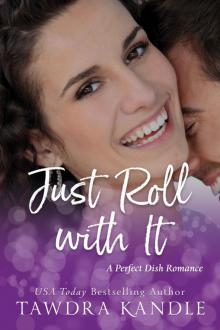 Just Roll With It (Perfect Dish Romances Book 4)
Just Roll With It (Perfect Dish Romances Book 4)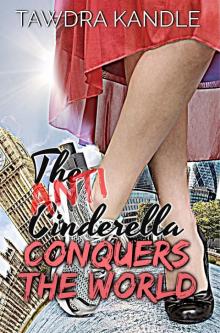 The Anti-Cinderella Conquers the World
The Anti-Cinderella Conquers the World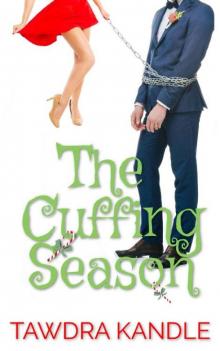 The Cuffing Season (The Anti-Cinderella Chronicles)
The Cuffing Season (The Anti-Cinderella Chronicles) Just Desserts (Perfect Dish Romances Book 2)
Just Desserts (Perfect Dish Romances Book 2)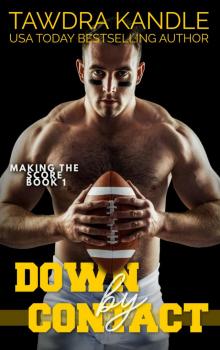 Down By Contact: A Making the Score Football Romance
Down By Contact: A Making the Score Football Romance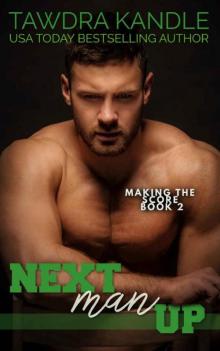 Next Man Up (Making the Score Football Romance Book 2)
Next Man Up (Making the Score Football Romance Book 2) Not Broken Anymore
Not Broken Anymore The Keeping Score Box Set
The Keeping Score Box Set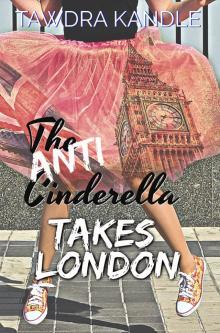 The Anti-Cinderella Takes London
The Anti-Cinderella Takes London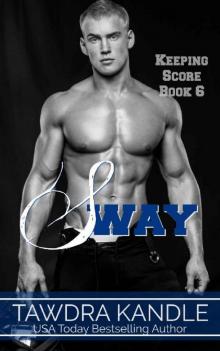 Sway (Keeping Score Book 6)
Sway (Keeping Score Book 6)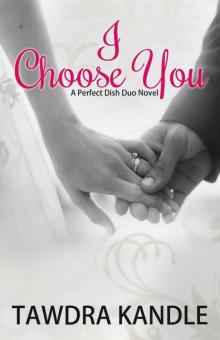 I Choose You
I Choose You Death Over Easy
Death Over Easy Endless
Endless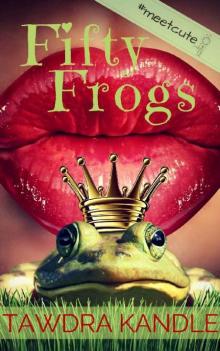 Fifty Frogs (The Anti-Cinderella Chronicles Book 4)
Fifty Frogs (The Anti-Cinderella Chronicles Book 4)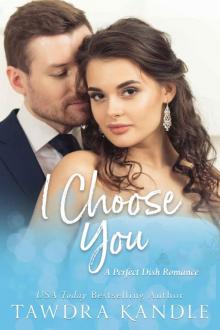 I Choose You (Perfect Dish Romances Book 3)
I Choose You (Perfect Dish Romances Book 3)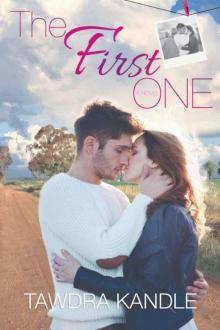 The First One
The First One Best Served Cold (Perfect Dish Romances Book 1)
Best Served Cold (Perfect Dish Romances Book 1)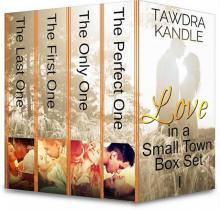 Love in a Small Town Box Set 1
Love in a Small Town Box Set 1 Stardust on the Sea
Stardust on the Sea Just Roll With It (A Perfect Dish Book 4)
Just Roll With It (A Perfect Dish Book 4) The Anti-Cinderella
The Anti-Cinderella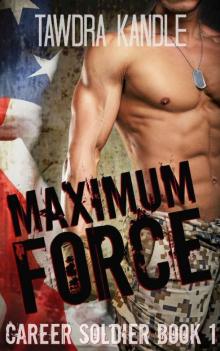 Maximum Force: A Career Soldier Military Romance
Maximum Force: A Career Soldier Military Romance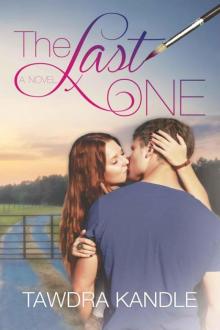 The Last One (The One Trilogy #1)
The Last One (The One Trilogy #1) Underneath My Christmas Tree
Underneath My Christmas Tree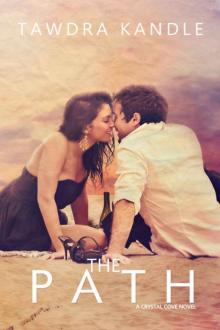 The Path
The Path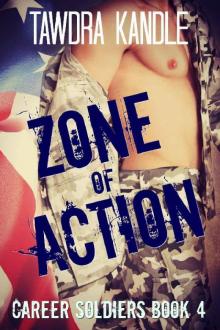 Zone of Action: A Career Soldier Military Romance
Zone of Action: A Career Soldier Military Romance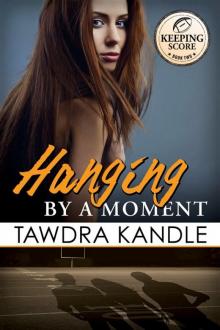 Hanging by a Moment (Keeping Score #2)
Hanging by a Moment (Keeping Score #2) Fifty Frogs
Fifty Frogs Age of Aquarius
Age of Aquarius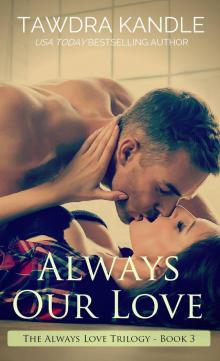 Always Our Love
Always Our Love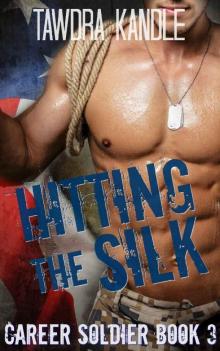 Hitting the Silk: A Career Soldier Military Romance
Hitting the Silk: A Career Soldier Military Romance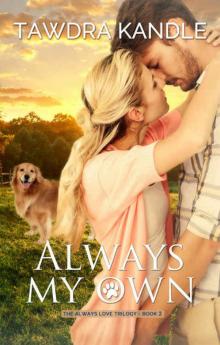 Always My Own (Always Love Trilogy #2)
Always My Own (Always Love Trilogy #2) Days of You and Me
Days of You and Me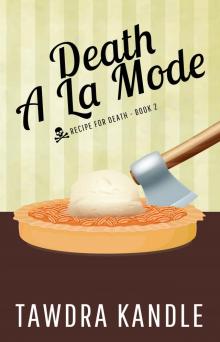 Death A La Mode
Death A La Mode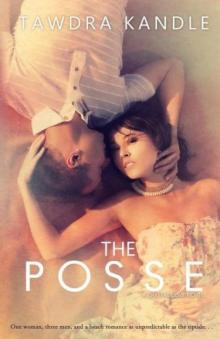 The Posse
The Posse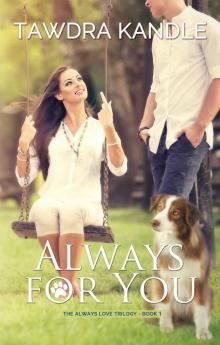 Always For You (Always Love Book 1)
Always For You (Always Love Book 1)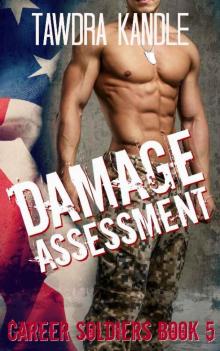 Damage Assessment: A Career Soldier Military Romance
Damage Assessment: A Career Soldier Military Romance The Plan
The Plan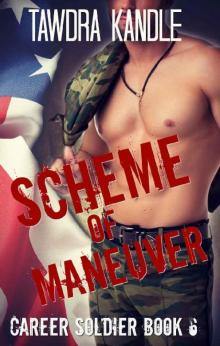 Scheme of Maneuver: A Career Soldier Military Romance
Scheme of Maneuver: A Career Soldier Military Romance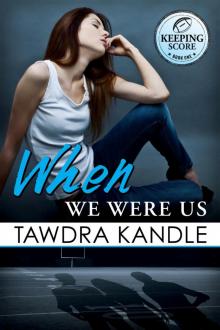 When We Were Us (Keeping Score, #1)
When We Were Us (Keeping Score, #1)